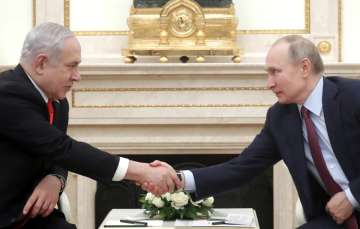Iran's deputy foreign minister holds meeting with Hamas representative in Russia amid war with Israel
Russia has faced criticism for hosting the Hamas representatives by the Israeli foreign ministry, which accused Moscow of "supporting terrorism" and called for the Hamas delegation to be expelled. Kremlin responded that it was necessary to maintain contacts with both sides.

Ali Bagheri Kani, Iran's deputy foreign minister, held a meeting with Abu Marzouk, a senior leader of the Hamas militant group, in Moscow on Friday to potentially discuss a ceasefire between Israel and Palestine amid a deadly war, reported TASS news agency.
According to the Iranian embassy in Moscow, the deputy foreign minister of Iran "arrived in Moscow at the invitation of his Russian counterpart for an exchange of opinions and bilateral talks" and met Marzouk in Moscow. He stressed the country's long-standing stance on supporting Palestine and said that Tehran seeks an immediate ceasefire, provision of aid and removal of the "repressive" blockade of the Gaza Strip.
On the previous day, Russian Deputy Foreign Minister Mikhail Bogdanov met Bagheri Kani in Moscow, where they noted the need for a ceasefire in the Middle East and humanitarian aid to Palestinians. Meanwhile, the Hamas delegation praised Russia's stance on the ongoing war.
The meeting is likely to draw condemnation from Israel, whose foreign ministry slammed Russia's decision to invite Hamas representatives to Moscow as “an act of support of terrorism," and called for the delegation to be expelled from Russia. The Kremlin responded by saying that Moscow believes it is necessary to maintain contact with all parties.
What did the Kremlin say?
Kremlin spokesperson Dmitry Peskov on Friday denied any contacts between the Hamas delegation in Moscow and the Kremlin, and also said that they won't have any 'Kremlin programme'.
"There were reports [about the Hamas delegation's visit to Moscow] along the lines of the Foreign Ministry. We believe it is necessary to continue contacts with all sides and, of course, we will continue our dialogue with Israel," he said at a press briefing.
Peskov further said that no manifestations of terrorism can be justified, in line with Russian President Vladimir Putin's position and reiterated its concerns over the humanitarian crisis in Gaza. He also said that the Israel-Palestine conflict causes tensions across the Middle East.
What is Russia's position on the conflict?
The visit of the Iranian deputy foreign minister and the Hamas delegation highlights how Russia is trying to assert its role as a power broker in the Middle East conflict even though it continues to be occupied with its war in Ukraine.
Russia had earlier called for the immediate release of all hostages taken by Hamas militants, even as Putin said that Israel has "the right to defend itself". It also called for the "unimpeded provision and distribution of humanitarian assistance, including of food, fuel and medical treatment, as well as creating conditions for the safe evacuation of civilians in need".
The Soviet Union strongly backed the Palestinians and other allies in the Arab world against Israel during the Cold War by providing them with military and political support. However, relations with Israel were restored under Soviet leader Mikhail Gorbachev shortly before the collapse of the Soviet Union.
Meanwhile, the Russian embassy in Israel strongly opposed allegations of Moscow supporting any kind of terrorism by inviting the Iranian and Hamas delegations, saying that such accusations are "absolutely unacceptable".
"Position of Russia is consistent, remains unchanged and has been repeatedly confirmed at all levels... We find absolutely unacceptable any attempts to accuse us of supporting terrorism and thereby distort and erode our fundamental approaches as well as cast doubt on the purposeful work of our country to solve primary humanitarian tasks that meet the interests of the citizens of Russia, Israel, Palestine and other countries," said the embassy in a statement.
Since the start of the Ukraine war, many Russians have moved to Israel. However, Israel has voiced support for Kyiv but refused to provide it with weapons, while many Israelis were angered by Putin's claim that Ukraine's Jewish president, Volodymyr Zelenskyy, is a neo-Nazi.
Iran's threat to the US
In a United Nations address, Iran's foreign minister Hossein Amirabdollahian warned the United States of "uncontrollable consequences" if it backs Israel's war against Hamas, The Hill reported.
"I say frankly to the American statemen who are now managing the genocide in Palestine that we do not welcome the expansion of the war in the region. But I warn, if the genocide in Gaza continues, they will not be spared from this fire. It is our home and West Asia is our region," he said.
Iran is considered to be a backer and strong ally of the Hamas group, which has taken at least 233 people hostage during its surprise attack on Israel on October 7. Israeli Prime Minister Benjamin Netanyahu has previously warned Iran and the Iran-backed Hezbollah group against intervening in the conflict.
More than 1,400 people were killed in the Hamas attack on October 7 in Israel. The Jewish country launched a series of devastating airstrikes in the Gaza Strip that killed over 7,300 Palestinians and exacerbated a humanitarian crisis by besieging the territory and cutting off access to electricity, food, water and fuel.
(with agency inputs)
ALSO READ | US strikes Iran-linked sites in Syria in self-defence after attacks on its troops